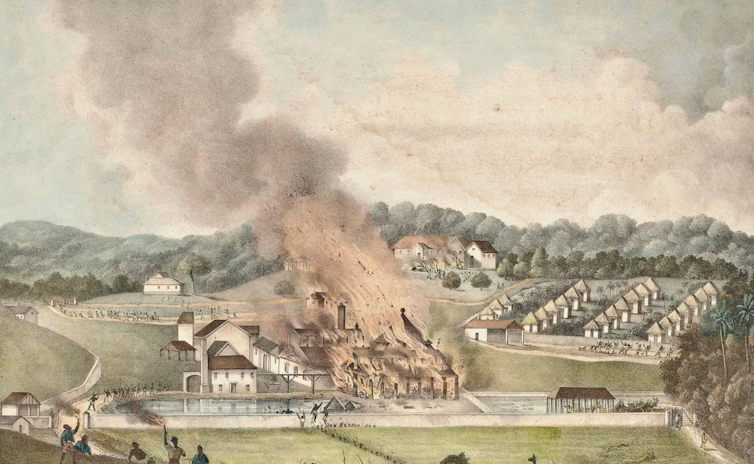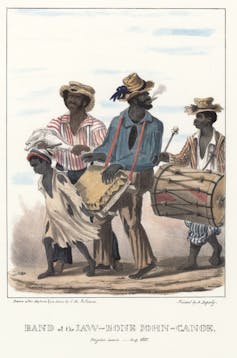
I’m sure everyone is familiar with the figure of justice, whose statue stand outside or inside many courthouses – not just the home of SCOTUS. But you may or may not know that the has a name and a history, Her name is Themis, and she is the daughter of Uranus and Gases(heaven and earth.) She was also the second wife of Zeus (his first wife, Juno, being notorious for her jealousy, which may partly explain why Themis is little known) and as such was the mother of the Hours, the Fates, and others. She was the goddess of law, cosmic order (equity), and oracular knowledge. Lawyers and law students know of her because her name is also the name of an online school which helps students cramming for their bar exams. She has been having a rough time lately, what with MAGA and other Talibangelical Christians who seem to think they can trifle with her.
Why do I bring her up in connection with an article on, among other things, Jubilee? Well, for one thing, sometimes true justice must be and is administered outside the courts. But as the Goddess of cosmic order, I think she would appreciate that.
Jubilee is not a Greek word; it presumably comes from Hebrew since it (the word and the concept) first appear, to my knowledge, in the complex details of Mosaic law. That law established the certain years would be years of Jubilee and all kinds of things must be done – probably any one of which would trouble the wealthy. Things like freeing slaves and canceling all debts. This article covers how at least some enslaved people in the United States were able to use the holiday season for individual Jubilees. (One of the songs from the period is even named “Jubilo.”) And then I’ll have a little more to say about Jubilee years.
*=*=*=*=*=*=*=*=*=*=*=*=*=*=*=*=*=*=*=
For enslaved people, the holiday season was a time for revelry – and a brief window to fight back

Wikimedia Commons
Ana Lucia Araujo, Howard University
During the era of slavery in the Americas, enslaved men, women and children also enjoyed the holidays. Slave owners usually gave them bigger portions of food, gifted them alcohol and provided extra days of rest.
Those gestures, however, were not made out of generosity.
As abolitionist, orator and diplomat Frederick Douglass explained, slave owners were trying to keep enslaved people under control by plying them with better meals and more downtime, in the hopes of preventing escapes and rebellions.
Most of the time, it worked.
But as I discuss in my recent book, “Humans in Shackles: An Atlantic History of Slavery,” many enslaved people were onto their owners and used this brief period of respite to plan escapes and start revolts.
Feasting, frolicking and fiddling
Most enslaved people in the Americas adhered to the Christian calendar – and celebrated Christmas – since either Catholicism or Protestantism predominated, from Birmingham, Alabama, to Brazil.
Consider the example of Solomon Northup, whose tragic story became widely known in the film “12 Years A Slave.” Northup was born free in the state of New York but was kidnapped and sold into slavery in Louisiana in 1841.
In his narrative, Northup explained that his owner and their neighbors gave their slaves between three and six days off during the holidays. He described this period as “carnival season with the children of bondage,” a time for “feasting, frolicking, and fiddling.”
According to Northup, each year a slave owner in central Louisiana’s Bayou Boeuf offered a Christmas dinner attended by as many as 500 enslaved people from neighboring plantations. After spending the entire year consuming meager meals, this marked a rare opportunity to indulge in several kinds of meats, vegetables, fruits, pies and tarts.

Slavery Images
There’s evidence of holiday celebrations since the early days of slavery in the Americas. In the British colony of Jamaica, a Christmas masquerade called Jonkonnu has taken place since the 17th century. One 19th-century artist depicted the celebration, painting four enslaved men playing musical instruments, including a container covered with animal skin, along with an instrument made from an animal’s jawbone.
In the 1861 narrative of her life in slavery, abolitionist Harriet Jacobs described a similar masquerade in North Carolina.
“Every child rises early on Christmas morning to see the Johnkannaus,” she wrote. “Without them, Christmas would be shorn of its greatest attraction.”
On Christmas Day, she continued, nearly 100 enslaved men paraded through the plantation wearing colorful costumes with cows’ tails fastened to their backs and horns decorating their heads. They went door to door, asking for donations to buy food, drinks and gifts. They sang, danced and played musical instruments they had fashioned themselves – drums made of sheepskin, metal triangles and an instrument fashioned from the jawbone of a horse, mule or donkey.
It’s the most wonderful time to escape
Yet beneath the revelry, there was an undercurrent of angst during the holidays for enslaved men, women and children.
In the American South, enslavers often sold or hired out their slaves in the first days of the year to pay their debts. During the week between Christmas and New Year’s Day, many enslaved men, women and children were consumed with worry over the possibility of being separated from their loved ones.
At the same time, slave owners and their overseers were often distracted – if not drunk – during the holidays. It was a prime opportunity to plan an escape.
John Andrew Jackson was owned by a Quaker family of planters in South Carolina. After being separated from his wife and child, he planned to escape during the Christmas holiday of 1846. He managed to flee to Charleston. From there, he went north and eventually reached New Brunswick in Canada. Sadly, he was never able to reunite with his enslaved relatives.
Even Harriet Tubman took advantage of the holiday respite. Five years after she successfully escaped from the Maryland plantation where she was enslaved, she returned on Christmas Day in 1854 to save her three brothers from a life of bondage.
‘Tis the season for rebellion
Across the Americas, the holiday break also offered a good opportunity to plot rebellions.
In 1811, enslaved and free people of color planned a series of revolts in Cuba, in what became known as the Aponte Rebellion. The scheming and preparations took place between Christmas Day and the Day of Kings, a Jan. 6 Catholic holiday commemorating the three magi who visited the infant Jesus. Inspired by the Haitian Revolution, free people of color and enslaved people joined forces to try to end slavery on the island.
In April, the Cuban government eventually smashed the rebellion.
In Jamaica, enslaved people followed suit. Samuel Sharpe, an enslaved Baptist lay deacon, called a general strike on Christmas Day 1831 to demand wages and better working conditions for the enslaved population.
Two nights later, a group of enslaved people set fire to a trash house at an estate in Montego Bay. The fire spread, and what was supposed to be a strike instead snowballed into a violent insurrection. The Christmas Rebellion – or Baptist War, as it became known – was the largest slave revolt in Jamaica’s history. For nearly two months, thousands of slaves battled British forces until they were eventually subdued. Sharpe was hanged in Montego Bay on May 23, 1832.
After news of the Christmas Rebellion and its violent repression reached Britain, antislavery activists ramped up their calls to ban slavery. The following year, Parliament passed the Slavery Abolition Act, which prohibited slavery in the British Empire.
Yes, the week between Christmas Day and New Year’s Day offered a chance to feast or plot rebellions.
But more importantly, it served as a rare window of opportunity for enslaved men, women and children to reclaim their humanity.![]()
Ana Lucia Araujo, Professor of History, Howard University
This article is republished from The Conversation under a Creative Commons license. Read the original article.
*=*=*=*=*=*=*=*=*=*=*=*=*=*=*=*=*=*=*=
As I said, Mosaic law established years of Jubilee, during which, essentially, everyone had a chance to start over, freed from obligations. I did not check my memory against the Bible, but IIRC, it was every fiftieth year. But if Pope Francis wants to make it every 25th tear, I’m all for it. And apparently he does. Because he has invited me to join a Zoom call on planning for Jubilee 2025 (the last one was Jubilee 2000.) And that call is happening Monday, December 23. I didn’t get an invitation because I am special – I’m not – I assume it’s because I have signed petitions for justice that I got on the list. So I am extending it further to all of you.
Here’s the description:
“Live from St. Peter’s Square, Jubilee and Caritas Internationalis leaders hold a press conference to launch campaigns on debt relief in 160 countries for Jubilee 2025. The December 23rd St. Peter’s press conference explains the themes of debt cancellation lifted for special Jubilee Years among faith communities. The high-level press panel takes place 24 hours before Pope Francis begins Jubilee 2025 by opening the Holy Jubilee Doors and Calls for global debt relief for our people and our planet.
And here’s when it starts on Zoom:
December 23, 2024 | Rome: 3:00 PM – Accra: 2:00 PM – Rio de Janeiro: 11:00 AM – Washington DC: 9:00 AM [EST, 8:00 AM Central, 7:00 AM Mountain, 6:00 AM Pacific – and I believe 5:00 AM Alaska and 4:00 AM Hawaii.]
And here’s how to get the Zoom link:
Go to https://docs.google.com/forms/d/e/1FAIpQLScZKbW9lh_ULG-poup0aCHHyXTViC-gXCZE-Aihlu_Mz94BCg/viewform Fill in your email address – click the circular box that says “Virtually” – add your name and a couple of other items, and you’ll be sent a live link. If you have never Zoomed before, you’ll b taken to a place where you can get their app, which takes up very little space on your computer and doesn’t mess with anything there; if you have Zoomed before this shouldn’t be necessary. And there you are.
If you have doubts that there are still any real Christians left, especially in major denominations (and I’m the first to admit that the Catholic Right is horrendous), maybe even just knowing this is happening may help alleviate them.
